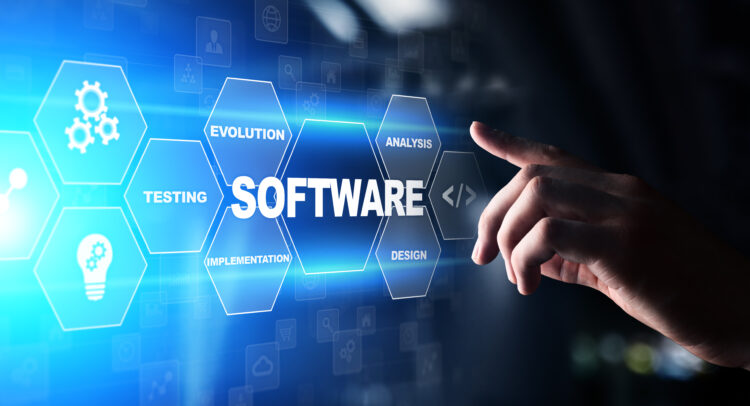In this piece, I evaluated two enterprise software stocks, Salesforce (NYSE:CRM) and SAP (NYSE:SAP), using TipRanks’ comparison tool to determine which is better.
Elevate Your Investing Strategy:
- Take advantage of TipRanks Premium at 55% off! Unlock powerful investing tools, advanced data, and expert analyst insights to help you invest with confidence.

Salesforce offers cloud-based software for customer relationship management (CRM) and industry-focused applications, including sales, marketing, customer service, e-commerce, automation, application development, and analytics. SAP is a Germany-based company that develops software to help enterprises manage their business operations, resources, and customer relations.
Both companies have been on tremendous tears this year, with Salesforce up 57% and SAP gaining 32.6% year-to-date. However, over the past year, Salesforce is up only 23%, while SAP has gained 52%.
The application software industry is trading at a price-to-sales (P/S) ratio of 7.7 versus its three-year average of 10.1. Most companies in the space are unprofitable, so the current price-to-earnings (P/E) ratio is deeply in the negative. However, the industry’s three-year P/E stands at around 233.
The application software industry’s current P/E flipped into the negative in March 2022, having been in the green before then. However, Salesforce and SAP are still profitable, setting them apart from the rest of the industry.
Salesforce (NYSE:CRM)
At a P/E of 557.3, Salesforce immediately looks obscenely expensive, but it’s also trading at a P/S of 6.2, making it look cheap versus its industry and its five-year mean P/S of 8.7. While its recent earnings results haven’t been great, its balance sheet and free cash flow are excellent, suggesting a neutral view may be appropriate — pending a more attractive entry point.
Salesforce shares have surged because of the company’s work on artificial-intelligence-related products. Investors have sent the shares of any company that’s even mentioned AI through the roof year-to-date. Like most tech companies, Salesforce has seen its operating expenses rise, climbing by over $2 billion from Fiscal 2022 to Fiscal 2023. However, its operating income has soared more than 200% over the last year, more than offsetting that increase.
Additionally, the company’s debt position is solid. While it issued almost $8 billion in debt during the year that ended in January 2022, it paid off $2 billion worth of debt in the year that ended in January 2023. Additionally, Salesforce has a debt-to-equity ratio of 24%, displaying a low degree of debt-related risk. It also generates plenty of cash flow — more than $7 billion over the last 12 months.
However, insiders have sold $136.6 million worth of Salesforce shares over the last three months. Notably, the company’s price activity has triggered multiple auto-sells among insiders’ pre-set trading plans around recent price peaks, suggesting insiders might think it’s fully valued at current prices.
What is the Price Target for CRM Stock?
Salesforce has a Moderate Buy consensus rating based on 22 Buys, 10 Holds, and one Sell rating assigned over the last three months. At $239.10, the average Salesforce stock price target implies upside potential of 12.25%.

SAP (NYSE:SAP)
SAP is trading at a P/E of 71.4 and a P/S of 4.8, making it far cheaper than Salesforce. However, a wider look at its stock price trends and insider buying and selling activity suggests a neutral view could be appropriate.
SAP shares also received a massive boost this year due to AI mentions by management. Additionally, the company faces many of the same challenges as Salesforce with rising operating expenses, although it also generates plenty of cash flow — around €2.3 billion in just the most recent quarter alone.
Next, insider trading activity in SAP has been mixed, but a closer look at the timing of those activities is very revealing. Regarding Informative Sell transactions, insiders exercised some options about 23 days ago when the stock was trading at around its 52-week high.
However, they bought some shares about a month ago, when the stock was down to around $131 on the U.S. exchange. This tight range suggests insiders could see the $137-and-higher range as fairly valued or overvalued and the $131 area as undervalued.
What is the Price Target for SAP Stock?
SAP has a Moderate Buy consensus rating based on five Buys, three Holds, and zero Sell ratings assigned over the last three months. At $155.33, the average SAP stock price target implies upside potential of 16.2%.

Conclusion: Neutral on CRM and SAP
Both companies look like solid long-term plays that are trading around the top of their recent ranges. Unfortunately, stock-based compensation is also a critical issue weighing on both companies. However, both have staying power and excellent business trends, so they’re worth monitoring for more attractive entry points.
















